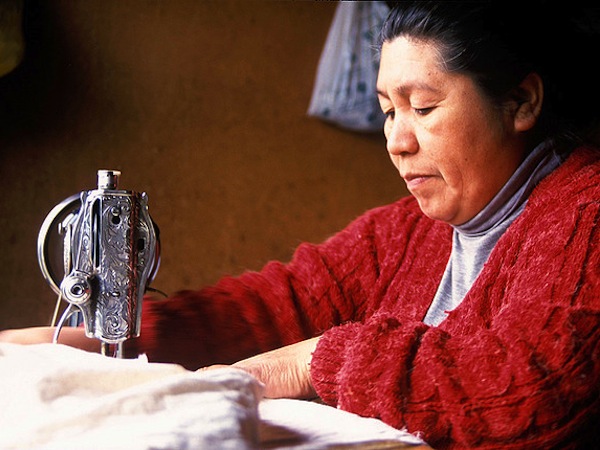The phrase “unethically produced clothing” usually conjures images of sweatshops in China, with workers packed shoulder-to-shoulder, labouring long hours for a pittance.
Unfortunately, the reality on our own shores is almost as sordid.
Australia’s rag trade is littered with the underpaid and the overworked. These people are known as ‘outworkers’ and they are among Australia’s lowest paid employees.
According to the Textile Clothing and Footwear Union of Australia, approximately 50-70% of Australian made clothing is outsourced to migrant women working from home or in backyard sweatshops.
Not every outworker is a victim of this unforgiving fashion regime. For some, it suits their lifestyle, allowing them to work from home, care for their families and receive award wages.
For others, it is a harsh and trying industry.
Many outworkers are highly skilled, yet this is often their only viable source of income.
If they dare to speak out about their mistreatment – and someone deigns to listen – they are cast aside in favour of impressionable women who will work for loose change, oblivious to the injustice.
The high turnover is amplified as companies pit the workers against each other, auctioning off jobs to whoever will accept the lowest rate.
On Boxing Day 2011, the Herald Sun published an expose, divulging the truth about Melbourne’s sweatshops and the brands that use them.
Myer and The Just Group were two of the brands implicated. When contacted by upstart, Myer failed to respond.
The Just Group issued a statement to upstart: “The Just Group holds a long track record of operating in international markets and within international laws. At all times we are committed to following ethical standards in all brands, on all of our products. We regularly and independently audit all manufacturers for compliance.”
Whether or not these companies have reformed their processes, the problem remains prevalent in the industry. Australia continues to turn a blind eye to the conditions under which locally made clothing is manufactured.
Accreditation Advisor for Ethical Clothing Australia, Rebekka Carey-Smith, said it really is a case of “out of sight, out of mind”.
Outworkers generally work in isolation, prevented from conferring with peers about their absent rights. They are inundated with high volumes of clothing to sew on tight or even unattainable deadlines.
Those who don’t speak English are even more vulnerable to exploitation.
“Some people, unfortunately mainly migrant women, work up to 17 hours a day earning as little as $5 an hour,” said Carey-Smith. “They don’t know what rights they are entitled to.”
Legally, in addition to award wages, outworkers are entitled to all the benefits that employees are afforded, such as superannuation, sick leave and insurance, yet most receive none of these basic prerogatives. Instead, they are rewarded with a towering pile of fabric and a back injury for all their hard work.
It may seem like a dire situation, but it’s easy to see how it could happen.
With fashion labels contending for the market share, production costs are routinely cut to be competitive and offer the most affordable clothing. Quality and sustainability fall by the wayside when it comes to fast fashion.
While outsourcing to sweatshops abroad may seem like the most lucrative avenue, locally made clothing can be both affordable and convenient. It means there are no long trips to oversee production, and shipping costs are greatly reduced.
“Manufacturing onshore really is a viable option because it means you are in complete control of production,” said Carey-Smith.
With fashion houses able to produce their stock locally at such a low cost, ‘Australian Made’ is no longer synonymous with ethical clothing.
As you move down the supply chain, it can be hard to point the finger at a culprit. Production work is outsourced to companies who then delegate tasks to outworkers. Many high profile companies aren’t even aware of the transgressions at the other end of the chain.
Until the big brands are held accountable, the ‘Australian Made’ label will continue to lose value. Yes, it is great to support local businesses, but how much pride can we bestow on unethical products?
The kneejerk reaction is to suggest a boycott of all brands that lack a transparent supply chain. Alas, this only leads to redundancy for the very people it aims to protect.
“It’s more important to educate the companies about what they need to do to ensure their employees are getting paid enough and are working in ethical conditions,” said Carey-Smith.
In the wake of the issue, the slow fashion movement is gaining momentum in Australia. The antithesis to the sleazy world of fast fashion, it endeavours to create a resistance to consumerism by encouraging shoppers to be more mindful about their purchases.
If this can generate a surge of support for accredited ethical labels, the Australian fashion industry may be able to salvage its tarnished reputation by promoting a culture of integrity and respect.
And of course, the outworkers might even get a raise.
 Rachel Wagner is a fourth year Bachelor of Laws and Media Studies student at La Trobe University and a staff writer for upstart. Follow her on Twitter @rachelshae
Rachel Wagner is a fourth year Bachelor of Laws and Media Studies student at La Trobe University and a staff writer for upstart. Follow her on Twitter @rachelshae
Photo: Flickr







